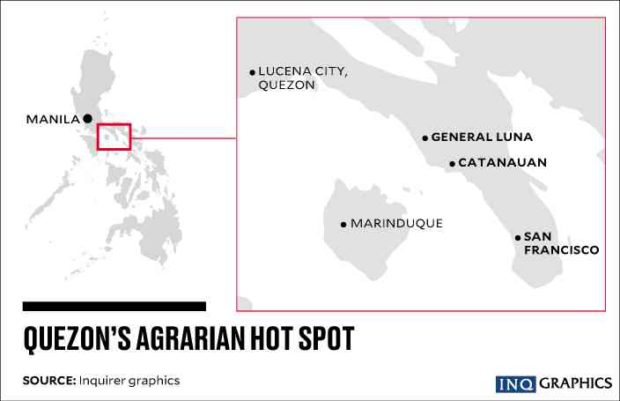
Col. Elias Escarcha, commander of the Army’s 201st Infantry Brigade, said a group of New People’s Army (NPA) rebels fired at a military truck transporting a group of soldiers from the Army’s engineering brigade along the Bondoc Peninsula Highway in Barangay Bacong Ibaba at 9:15 a.m. The attack was followed by a land mine explosion, he said.
“The [rebels] targeted the military truck… without considering the safety of innocent civilians,” he said, referring to the wounded residents aboard a passenger jeepney and a tricycle tailing the truck.
Police said jeepney passengers Hazel Macalalad, 24, and her children Kimberly, 6, and Albert, 2, all residents of neighboring Catanauan town, were hit by shrapnel after the land mine blast.
In a separate interview, Senior Insp. Eliezer Cayco, General Luna police chief, said John Joseph Robredo, 21, and Marita Ramos, 54, who were in the tricycle, were also wounded in the attack.
Reports did not identify the wounded soldiers.
Escarcha said the rebels also fired at an Army detachment in Barangay 9, Catanauan, about the same time as the attack in General Luna. No one, however, was hurt in this incident.
“It was purely harassment and not an attack,” he said.
Hacienda attack
A team composed of policemen and soldiers was pursuing the rebels responsible for the attacks.
On Monday, suspected NPA rebels raided a coconut plantation in San Francisco town and briefly held six people.
Lt. Col. Ely Tono, commander of the Army’s 85th Infantry Battalion based in the Bondoc Peninsula district, said the rebels took two members of the Citizen Armed Forces Geographical Unit (Cafgu) and four security guards of Hacienda Tumbaga in Barangay Nasalaan past 5 p.m.
“But they were eventually freed. They returned to the ranch a few hours later,” Tono said in a telephone interview on Tuesday.
The rebels, reports said, took six Armalite rifles from a house in the ranch during the raid.
Tono said at least 50 people, among them women, attacked the plantation. “Most of them were unarmed,” he added.
NPA warning
The hacienda, mostly coconut farmlands, is being managed by caretakers, he said.
The NPA warned big landlords in the province to prepare for attacks should they continue with their “antifarmer policy.”
“The raid was a punishment to [the owners of Hacienda Tumbaga] in their continuous refusal to give land to their tenants,” Cleo del Mundo, spokesperson of the NPA Apolonio Mendoza Command, said in a statement.
She said rebels also raided the same hacienda in 1997.
Del Mundo commended the rebels for the successful attacks on government forces.
“These successive military actions by the [NPA’s Apolonio Mendoza Command] have proven the capacity and resolve of the revolutionary movement in Quezon to face and defeat the full-scale war of the US-Duterte regime,” she said in a statement written in Filipino.
Lt. General Danilo Pamonag, commander of the military’s Southern Luzon Command, called the attacks as the handiwork of “terrorists.”
“Their history of atrocities and violations of human rights has proven that they are only pretending to be champions of the people,” Pamonag said in a statement.
Bondoc Peninsula, in Quezon’s third congressional district, is known as one of the agrarian hot spots in Southern Tagalog where several landowners control big landholdings in the towns of San Francisco, San Andres, San Narciso, Mulanay and Buenavista.

